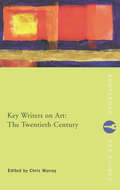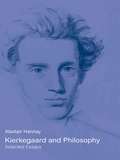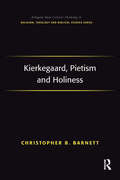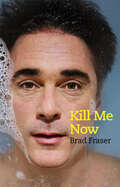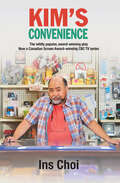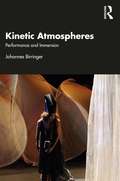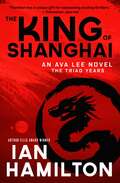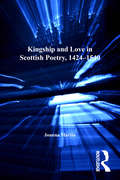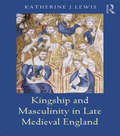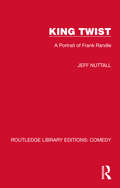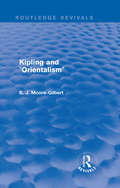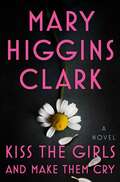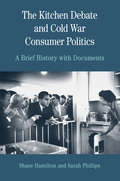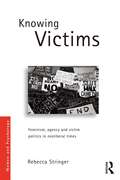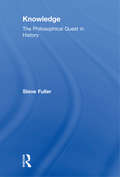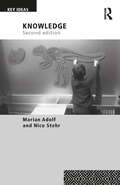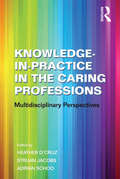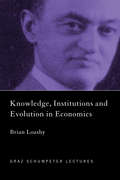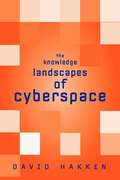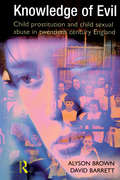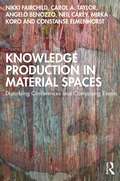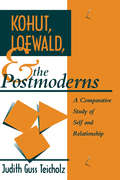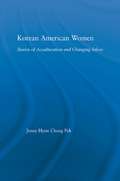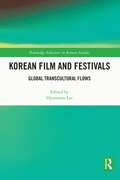Special Collections
Benetech’s Global Certified Accessible Titles
Description: Benetech’s GCA program is the first independent third-party EPUB certification to verify ebook accessibility. By creating content that is born accessible, publishers can meet the needs of all readers. Learn more: https://bornaccessible.benetech.org/
- Table View
- List View
Key Writers on Art: The Twentieth Century
by Chris MurrayKey Writers on Art: The Twentieth Century offers a unique and authoritative guide to modern responses to art. Featuring 48 essays on the most important twentieth century writers and thinkers and written by an international panel of expert contributors, it introduces readers to key approaches and analytical tools used in the study of contemporary art. It discusses writers such as Adorno, Barthes, Benjamin, Freud, Greenberg, Heuser, Kristeva, Merleau-Ponty, Pollock, Read and Sontag.
Kierkegaard and Philosophy
by Alastair HannayKierkegaard and Philosophy makes many of the most important papers on Kierkegaard available in one place for the first time. These seventeen essays, written over a period of over twenty years, have all been substantially revised or specially prepared for this collection, with a new introduction by the author.In the first part, Alastair Hannay concentrates on Kierkegaard's central philosophical writings, offering closely text-based accounts of the silent concepts Kierkegaard uses. The second part shows the relevance of other thinkers' treatments of shared themes, pointing out where they differ from Kierkegaard. The concluding chapter provides a reason Kierkegaard himself would give for disagreeing with those who claim his texts are infinitely interpretable.Written by the world's foremost Kierkegaard scholar and translator, Kierkegaard and Philosophy is an indispensible resource for all students of Kierkegaard's work.
Kierkegaard, Pietism and Holiness
by Christopher B. BarnettSøren Kierkegaard wrote that Pietism is 'the one and only consequence of Christianity'. Praise of this sort - particularly when coupled with Kierkegaard's significant personal connections to the movement in Christian spirituality known as Pietism - would seem to demand thorough investigation. And yet, Kierkegaard's relation to Pietism has been largely neglected in the secondary literature. Kierkegaard, Pietism and Holiness fills this scholarly gap and, in doing so, provides the first full-length study of Kierkegaard's relation to the Pietist movement. First accounting for Pietism's role in Kierkegaard's social, ecclesial, and intellectual background, Barnett goes on to demonstrate Pietism's impact on Kierkegaard's published authorship, principally regarding the relationship between Christian holiness and secular culture. This book not only establishes Pietism as a formative influence on Kierkegaard's life and thinking, but also sheds fresh light on crucial Kierkegaardian concepts, from the importance of 'upbuilding' to the imitation of Christ.
Kill For You
by Kia D. RichardsI COULDN&’T PROTECT YOU THEN Twelve years ago, a devastating hit and run nearly killed Zenyia Washington, taking away the thing she cared about most in the world – her ability to play music. After working hard to start over, she&’s beginning a new chapter in her life.BUT I CAN NOW When the driver who destroyed her life is found brutally murdered, his body left slumped on a bench at her workplace, Zenyia becomes the prime suspect in the case.NO ONE WILL EVER HURT YOU AGAIN The person responsible did this for a reason – to show Zenyia just how much they care about her, that they belong together. And their plans are only just beginning… As Zenyia&’s new life comes crashing down and pieces of her old life suddenly reappear, who can she really trust? Kill For You is a stunning psychological thriller perfect for fans of Jane Corry and CL Taylor. 'Such a gripping read. . . you will not want to put this book down' Reader review'Among my favourite reads of the year. . . I couldn't believe at first when that shocking twist came' Reader review'Spectacular . . . frightening yet exhilarating' Reader review
Kill Me Now
by Brad FraserWhen Joey enters puberty, his father Jake finds himself in a morally ambiguous position. Joey is severely disabled, but he still has the same sexual desires as any seventeen-year-old boy, only he can’t do anything to relieve the tension. Jake is a widower whose life is devoted to his son, but when he suddenly develops a serious medical condition, he becomes the one to rely on the people around him, including his sister Twyla, his friend Robyn, and Joey’s best friend Rowdy. As Jake’s condition worsens, an ethical dilemma troubles the household as everyone is forced to consider the possibility of saying goodbye.
Kim's Convenience
by Ins ChoiA brand new edition of the smash-hit play, now a wildly popular CBC TV series. Mr. Kim is a first-generation Korean immigrant and the proud owner of Kim’s Convenience, a variety store located in the heart of downtown Toronto’s Regent Park neighbourhood. As the neighbourhood quickly gentrifies, Mr. Kim is offered a generous sum of money to sell — enough to allow him and his wife to finally retire. But Kim’s Convenience is more than just his livelihood — it is his legacy. As Mr. Kim tries desperately, and hilariously, to convince his daughter Janet, a budding photographer, to take over the store, his wife sneaks out to meet their estranged son Jung, who has not seen or spoken to his father in sixteen years and who has now become a father himself. Wholly original, hysterically funny, and deeply moving, Kim’s Convenience tells the story of one Korean family struggling to face the future amidst the bitter memories of their past.
Kinetic Atmospheres
by Johannes BirringerThis book offers a sustained and deeply experiential pragmatic study of performance environments, here defined at unstable, emerging, and multisensational atmospheres, open to interactions and travels in augmented virtualities. Birringer’s writings challenge common assumptions about embodiment and the digital, exploring and refining artistic research into physical movement behavior, gesture, sensing perception, cognition, and trans-sensory hallucination. If landscapes are autobiographical, and atmospheres prompt us to enter blurred lines of a "forest knowledge," where light, shade, and darkness entangle us in foraging mediations of contaminated diversity, then such sensitization to elemental environments requires a focus on processual interaction. Provocative chapters probe various types of performance scenarios and immersive architectures of the real and the virtual. They break new ground in analyzing an extended choreographic – the building of hypersensorial scenographies that include a range of materialities as well as bodily and metabodily presences. Foregrounding his notion of kinetic atmospheres, the author intimates a technosomatic theory of dance, performance, and ritual processes, while engaging in a vivid cross-cultural dialogue with some of the leading digital and theatrical artists worldwide. This poetic meditation will be of great interest to students and scholars in theatre, performing arts as well as media arts practitioners, composers, programmers, and designers.
The King of Shanghai
by Ian HamiltonThe seventh novel in the Ava Lee series finds Ava caught up in the election for the chairmanship of the Triad Societies.It’s been three months since Uncle’s passing, and Ava is finally ready to begin her new life as a partner with May Ling Wong and her sister-in-law Amanda in their Three Sisters venture capital firm. Ava travels to Shanghai to hear a pitch on a new investment possibility: the creation of a fashion line by Clark and Gillian Po. She also meets with the mysterious Xu, a young man Uncle had been mentoring and who is the head of the triad in Shanghai. Xu makes an audacious business proposal that she and May Ling are compelled to consider. Meanwhile, separately and privately, he confides to Ava that he intends to run for the chairmanship of the Triad Societies and attempts to recruit her as his adviser.Against her will, Ava becomes enmeshed in triad warfare and her future is threatened…
Kingship and Love in Scottish Poetry, 1424–1540
by Joanna MartinLooking at late medieval Scottish poetic narratives which incorporate exploration of the amorousness of kings, this study places these poems in the context of Scotland's repeated experience of minority kings and a consequent instability in governance. The focus of this study is the presence of amatory discourses in poetry of a political or advisory nature, written in Scotland between the early fifteenth and the mid-sixteenth century. Joanna Martin offers new readings of the works of major figures in the Scottish literature of the period, including Robert Henryson, William Dunbar, and Sir David Lyndsay. At the same time, she provides new perspectives on anonymous texts, among them The Thre Prestis of Peblis and King Hart, and on the works of less well known writers such as John Bellenden and William Stewart, which are crucial to our understanding of the literary culture north of the Border during the period under discussion.
Kingship and Masculinity in Late Medieval England
by Katherine LewisKingship and Masculinity in Late Medieval England explores the dynamic between kingship and masculinity in fifteenth century England, with a particular focus on Henry V and Henry VI. The role of gender in the rhetoric and practice of medieval kingship is still largely unexplored by medieval historians. Discourses of masculinity informed much of the contemporary comment on fifteenth century kings, for a variety of purposes: to praise and eulogise but also to explain shortcomings and provide justification for deposition. Katherine J. Lewis examines discourses of masculinity in relation to contemporary understandings of the nature and acquisition of manhood in the period and considers the extent to which judgements of a king’s performance were informed by his ability to embody the right balance of manly qualities. This book’s primary concern is with how these two kings were presented, represented and perceived by those around them, but it also asks how far Henry V and Henry VI can be said to have understood the importance of personifying a particular brand of masculinity in their performance of kingship and of meeting the expectations of their subjects in this respect. It explores the extent to which their established reputations as inherently ‘manly’ and ‘unmanly’ kings were the product of their handling of political circumstances, but owed something to factors beyond their immediate control as well. Consideration is also given to Margaret of Anjou’s manipulation of ideologies of kingship and manhood in response to her husband’s incapacity, and the ramifications of this for perceptions of the relational gender identities which she and Henry VI embodied together. Kingship and Masculinity in Late Medieval England is an essential resource for students of gender and medieval history.
King Twist
by Jeff NuttallBorn in Wigan in 1901 and a childhood friend of George Formby, who was later to become his chief rival, Frank Randle was one of the greatest music-hall comedians of all time. His theatre career started in 1916, when he appeared as an acrobatic artist under the name of Arthur Twist. It was not until the thirties, however, that he achieved his greatest popularity and notoriety as a comedian whose wild, manic temperament introduced a fresh note of invention into popular entertainment. For ten years he ran his own touring company, Randle’s Scandals, playing to enthusiastic audiences all over the country. He also made a number of shoe-string movies and was the star of Blackpool’s most distinguished summer-season show. During the early fifties his health declined and he died in Blackpool in 1957. Originally published in 1978, Jeff Nuttall’s account of Frank Randle is both a portrait of a ‘very, very, funny man’ and the story of his own search as he pieced that portrait together by talking to Randle’s acquaintances, friends, colleagues and relations. What emerges from his narrative is a beautifully recorded analysis of the ways in which working-class values are expressed in popular entertainment and are thus ritualised by it. The image Nuttall builds of Randle also allows him to explore the perennial theme of the clown as outsider and, with the passing of Randle, he acknowledges the passing of a certain naïve optimism which Randle so expressively embodied.
Kipling and Orientalism
by B. J. Moore-GilbertFirst published in 1986, this book sets Kipling firmly in the historical context not only of contemporary India but of prior Anglo-Indian writers about India. Despite his enthusiastic reception in England as ‘revealer of the East’, in India he seems to have been regarded as just one more Anglo-Indian writer. The author demonstrates the traditionalism of Kipling’s use of the themes of Anglo-Indian fiction – themes such as the ‘White Man’s grave’, domestic instability, frustration and loneliness. In particular, Kipling is shown to be writing in a strongly conservative idiom, concentrating on the role of the British hierarchy as the determining factor in a response to India, on British insecurity and fears of a repeat of the 1857 mutiny, and regarding Indian institutions only in so far as they represented a threat to British rule. Conservative critiques of liberalism are also discussed.
Kiss the Girls and Make Them Cry
by Mary Higgins ClarkAn electrifying thriller from #1 New York Times bestselling author and &“Queen of Suspense&” Mary Higgins Clark!When investigative journalist Gina Kane receives an email from a &“CRyan&” describing her &“terrible experience&” while working at REL, a high-profile television news network, Gina knows she has to pursue the story. But when Ryan goes silent, Gina is shocked to discover the young woman has died tragically in a jet ski accident while on holiday. Meanwhile, REL counsel Michael Carter finds himself in a tricky spot as several more female employees have come forward with allegations of sexual misconduct. Carter approaches the CEO, offering to persuade the victims to accept settlements in exchange for their silence. It&’s a risky endeavor, but it could well make him rich. As more allegations emerge, Carter&’s attempts to keep the story from making headlines are matched only by Gina Kane&’s determination to uncover the truth. Was Ryan&’s death truly an accident? And when another accuser turns up dead, Gina realizes someone—or some people—will go to depraved lengths to keep the story from seeing the light. &“Clark&’s usual mixture now updated, with surprising and welcome assurance, for a new generation of imperiled women&” (Kirkus Reviews).
The Kitchen Debate and Cold War Consumer Politics
by Sarah Phillips and Shane HamiltonThe Kitchen Debate and Cold War Consumer Politics
Knowing Victims
by Rebecca StringerKnowing Victims explores the theme of victimhood in contemporary feminism and politics. It focuses on popular and scholarly constructions of feminism as ‘victim feminism’ – an ideology of passive victimhood that denies women’s agency – and provides the first comprehensive analysis of the debate about this ideology which has unfolded among feminists since the 1980s. The book critically examines a movement away from the language of victimhood across a wide array of discourses, and the neoliberal replacement of the concept of structural oppression with the concept of personal responsibility. In derogating the notion of ‘victim,’ neoliberalism promotes a conception of victimization as subjective rather than social, a state of mind, rather than a worldly situation. Drawing upon Nietzsche, Lyotard, rape crisis feminism and feminist philosophy, Stringer situates feminist politicizations of rape, interpersonal violence, economic inequality and welfare reform as key sites of resistance to the victim-blaming logic of neoliberalism. She suggests that although recent feminist critiques of ‘victim feminism’ have critically diagnosed the anti-victim movement, they have not positively defended victim politics. Stringer argues that a conception of the victim as an agentic bearer of knowledge, and an understanding of resentment as a generative force for social change, provides a potent counter to the negative construction of victimhood characteristic of the neoliberal era. This accessible and insightful analysis of feminism, neoliberalism and the social construction of victimhood will be of great interest to researchers and students in the disciplines of gender and women’s studies, psychology, sociology, politics and philosophy.
Knowledge
by Steve FullerThe theory of knowledge, or epistemology, is often regarded as a dry topic that bears little relation to actual knowledge practices. Knowledge: The Philosophical Quest in History addresses this perception by showing the roots, developments and prospects of modern epistemology from its beginnings in the nineteenth century to the present day. Beginning with an introduction to the central questions and problems in theory of knowledge, Steve Fuller goes on to demonstrate that contemporary epistemology is enriched by its interdisciplinarity, analysing keys areas including: Epistemology as Cognitive Economics Epistemology as Divine Psychology Epistemology as Philosophy of Science Epistemology as Sociology of Science Epistemology and Postmodernism. A wide-ranging and historically-informed assessment of the ways in which man has - and continues to - pursue, question, contest, expand and shape knowledge, this book is essential reading anyone in the Humanities and Social Sciences interested in the history and practical application of epistemology.
Knowledge
by Nico Stehr and Marian AdolfAs we move through our modern world, the phenomenon we call knowledge is always involved. Whether we talk of know-how, technology, innovation, politics or education, it is the concept of knowledge that ties them all together. But despite its ubiquity as a modern trope we seldom encounter knowledge in itself. How is it produced, where does it reside, and who owns it? Is knowledge always beneficial, will we know all there is to know at some point in the future, and does knowledge really equal power? This book pursues an original approach to this concept that seems to define so many aspects of modern societies. It explores the topic from a distinctly sociological perspective, and traces the many ways that knowledge is woven into the very fabric of modern society.
Knowledge-in-Practice in the Caring Professions
by Struan JacobsKnowledge-in-Practice in the Caring Professions explores the nature and role of knowledge in the practical work of the caring professions. It focuses on knowledge of the practical over the theoretical, looking at the application of theory and the implementation of skill, judgment and discretion. Containing contributions from experts in a variety of fields, the research within this book offers a unique perspective on professional practice as multi-disciplinary, illustrating shared and overlapping understandings in knowledge-in-practice between the different professions as well as understandings that are distinctive to each discipline. It underlines that in order to effectively address the range of social, psychological and health problems facing contemporary societies, professionals need to engage in cooperative models of practice.
Knowledge, Institutions and Evolution in Economics
by Brian LoasbyWinner of the Schumpeter Prize, 2000 and Winner of the Smith Prize in Austrian Economics, 2000, this book explores how the limitations of human knowledge create both opportunities and problems in the modern economy. The growing field of evolutionary economics has developed as a result of the traditional failure of the discipline to explain certain phenomena that impact greatly on the economy. These are:*Evolution - the impact on the economy of natural change over time*Institutions - the impact on the economy of government and/or company policy, rules and regulations*Knowledge - the impact on the economy that is felt when new information becomes availableKnowledge, Institutions and Evolution in Economics is a punchy overview of these topics and one that has become regarded as something of a modern classic that no serious social sciences academic or student should be without.
The Knowledge Landscapes of Cyberspace
by David HakkenHow is knowledge produced and used in cyberspace? David Hakken - a key figure in the anthropology of science and technology studies - approaches the study of cyberculture through the venue of knowledge production, drawing on critical theory from anthropology, philosophy and informatics (computer science) to examine how the character and social functions of knowledge change profoundly in computer-saturated environments. He looks at what informational technologies offer, how they are being employed, and how they are tied to various agendas and forms of power. Knowledge Landscapes will be essential for both social scientists and cultural studies scholars doing research on cyberculture.
Knowledge of Evil
by David Barrett and Alyson BrownThis book aims to document and analyse the enduring involvement of children in the commercial sex trade in twentieth-century England. It uncovers new evidence to indicate the extent of under-age prostitution over this period, a much-neglected subject despite the increased visibility of children more generally. The authors argue that child prostitution needs to be understood within a broader context of child abuse, and that this provides one of the clearest manifestations of the way in which 'deviant groups' can be conceived of as both victims and threats. The picture of child prostitution which emerges is one of exclusion from mainstream society and the law, and remoteness from the agencies set up to help young people in trouble, which were often reluctant to accept the realities of child prostitution. The evidence provided in this book indicates that the circumstances which have led young people into prostitution over the last hundred years amount, at worst, to physical or psychological abuse or neglect, and at best as the result of limited choice.
Knowledge Production in Material Spaces
by Neil Carey and Carol A. Taylor and Nikki Fairchild and Angelo Benozzo and Mirka Koro and Constanse ElmenhorstKnowledge Production in Material Spaces is a curation of the interventions that the authors undertook at a range of academic conferences since 2016. It problematizes disciplined practices and expectations governing academic conference spaces and generates new ways of thinking and doing conferences otherwise. The authors use posthuman, feminist materialist and post-qualitative theories to disrupt knowledge production in neoliberal and bureaucratic conferences spaces. The analysis they offer, and the rhizomatic writing and presentational styles they use, promote a form of educational activism through theory. They interrogate the conference space as a regulated, normalized and standardized mode of academic knowledge production – which they call the ‘AcademicConferenceMachine’ – and playfully subvert the dominant meanings and modes of conferences and workshops to show how we can better interact and produce research, with and for each other. The authors indicate how creative conference practices promote playful possibilities to imagine and produce knowledge differently. This book will appeal to audiences ranging from established professionals to early career scholars, doctoral and master’s students in Education and the social sciences.
Kohut, Loewald and the Postmoderns
by Judith G. TeicholzIn Kohut, Loewald, and the Postmoderns, Judith Teicholz, using the contemporary critique of Kohut and Loewald as a touchstone of inquiry into the current status of psychoanalysis, focuses on a select group of postmodern theorists whose recent writings comprise a questioning subtext to Kohut's and Loewald's ideas. Acutely aware of the important differences among these theorists, Teicholz nonetheless believes that their respective contributions, which present psychoanalysis as an interactive process in which the analyst's own subjectivity plays a constitutive role in the joint construction of meanings, achieve shared significance as a postmodern critique of Kohut and Loewald. She is especially concerned with the relationship - both theoretically and technically -between Kohut's emphasis on the analyst's empathic resonance with the analysand's viewpoint and affect, and the postmodern theorists' shared insistence on the expression of the analyst's own subjectivity in the treatment situation. Her analysis incorporates fine insight into the tensions and ambiguities in Kohut and Loewald, whose work ultimately emerges as a way station between modern and postmodern viewpoints, and her appreciation of Kohut and Loewald as transitional theorists makes for an admirably even-handed exposition. She emphasizes throughout the various ways in which Kohut and Loewald gave nascent expression to postmodern attitudes, but she is no less appreciative of the originality of postmodern theorists, who address genuine lacunae in the thought and writings of these exemplars of an earlier generation. Teicholz's examination of what she terms two overlapping "partial revolutions" in psychoanalysis - that of Kohut and Loewald on one hand and of the postmoderns on the other - throws an illuminating searchlight on the path psychoanalysis has traveled over the last quarter of the 20th century.
Korean American Women
by Jenny PakCurrent models of acculturation in multicultural counseling literature are severely limited in describing how individuals deal with the complexity of culture change. The reasons for immigration, the historical period during which the immigration occurred, educational and socioeconomic levels, ethnic community and religious involvements, family functioning, and social support, to name a few, all have an impact in the process of cultural adaptation. This book examines Korean American women's dual-cultural identity. By utilizing multiple case studies, the book highlights: (1) the complexity of issues involved as individuals go through different levels of culture change, and (2) the multiplicity of people negotiating their lives in the dual-cultural context and creating meaning out of many ambiguous and even contradictory life situations.
Korean Film and Festivals
by Hyunseon LeeThis book examines the various film festivals where Korean cinema plays a significant role, both inside and outside of Korea, focusing on their history, structure and function, and analysis of successful festival films. Using Korean film festivals and Korean cinema at international film festivals as its primary lens, this interdisciplinary volume explores the shifting relationships between the multi-media genre of film and the fast-growing changing world of film festival cultures. It examines the changing aesthetics of Korean film in a transcultural context and historical (dis)continuity from a variety of angles from film and media studies, literary and cultural studies, Korean studies, Japanese studies, and also from film festival practice. Moreover, through comprehensive examinations of both domestic and international film festivals from the perspectives of production, distribution and marketing it highlights the reception of Korean cinema outside of Korea in an increasingly globalised industry. Featuring the contributions of expert scholars of international film and Korean cinema, in addition to interview material with a practicing film professional, this book will be of huge interest to students and scholars of Korean and Asian film and media studies, as well as those interested in the impact of film festivals more generally.
